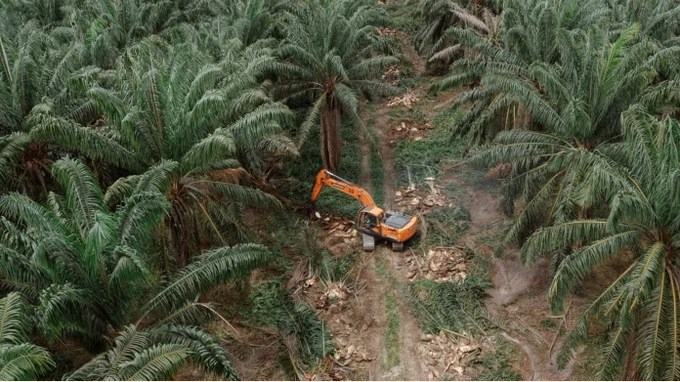May 25, 2025 | 04:56 GMT +7
May 25, 2025 | 04:56 GMT +7
Hotline: 0913.378.918
May 25, 2025 | 04:56 GMT +7
Hotline: 0913.378.918

An excavator topples a palm tree in a plantation in Kalimantan. Indonesia is the world’s biggest palm oil producer.
Indonesian palm oil producers have warned of global supply chain disruption if the EU proceeds with a ban on the import of commodities linked to deforestation this year. Indonesia is the world’s biggest palm oil producer.
The EU Deforestation Regulation, which is set to come into force on December 30, requires importers of cattle, cocoa, coffee, oil palm, rubber, soya and wood to ensure products entering the EU have not caused deforestation or forest degradation. Compliance requires extensive data collection.
“There will be chaos if implemented,” Eddy Martono, chair of the Indonesian Palm Oil Association, told the Financial Times. “The lack of meaningful consultation between EU policymakers and their trading partners has resulted in widespread uncertainty over how this regulation will be implemented.”
The industry trade group chair urged the EU to postpone implementation of the law until 2026. Martono’s complaints come as calls to delay implementation have escalated. Commodities producers in south-east Asia, Latin America and the US allege the new rules amount to a trade barrier, while some EU member states oppose the law because of the administrative burden it places on importers. “Prices will increase and supply will decrease, not just from Indonesia, even from Malaysia,” he said.
Between them, Indonesia and Malaysia account for nearly 90 per cent of the total supply of palm oil, the world’s most consumed edible oil. Global cocoa and coffee prices have already jumped in recent weeks amid supply fears, in part linked to the EUDR.
Industries that rely on palm oil, such as cosmetics, oleochemicals and pharmaceutical industries, will suffer, Martono said. Palm oil is used in everything from pizza and lipstick to chocolate. If the law comes into force at the end of the year, Indonesia’s shipments to the EU could fall 30 per cent, he said.
Indonesian producers shipped 4mn tonnes of palm oil to the EU in 2023. Malaysia, the world’s second-largest palm oil producer, has also warned of potential disruption to the supply chain. Compliance is difficult because of the complex nature of palm oil traceability, Belvinder Kaur, chief executive of the Malaysian Palm Oil Council, told the FT.
“For instance, a single sales order of one product could involve multiple batches from refineries, mills and plantations, resulting in millions of data points for a single shipment,” she said.
“This presents significant challenges for exporters, operators and competent authorities during the due diligence and auditing process. “The EU has not sufficiently addressed these complexities,” she added. Smaller producers face the biggest challenge with compliance, said Kaur.
“Small farmers continue to face difficulties meeting EUDR requirements, which will add significant administrative burdens and operational costs, risking their exclusion from the supply chain.”
Activists have long accused the palm oil industry of clearing tropical forests and destroying wildlife habitats to plant palm trees. Indonesia and Malaysia have over the years taken steps towards more sustainable production, though environmental groups say much remains to be done.
Indonesia and Malaysia have criticised the EU for not recognising the work that has already been done to improve sustainability, while Australia and Brazil have accused the EU of using incorrect deforestation data.
Martono said the bloc was using “flawed forest maps” that misclassified some areas of downtown Jakarta as “undisturbed forest areas”. “Such errors risk unfairly blocking imports of sustainably produced goods,” he said.
(FT)

(VAN) Alt Carbon has raised $12 million in a seed round as it plans to scale its carbon dioxide removal work in the South Asian nation.

(VAN) Attempts to bring down the price of the Japanese staple have had little effect amid a cost-of-living crisis.

(VAN) Fourth most important food crop in peril as Latin America and Caribbean suffer from slow-onset climate disaster.

(VAN) Shifting market dynamics and the noise around new legislation has propelled Trouw Nutrition’s research around early life nutrition in poultry. Today, it continues to be a key area of research.

(VAN) India is concerned about its food security and the livelihoods of its farmers if more US food imports are allowed.

(VAN) FAO's Director-General emphasises the need to work together to transform agrifood systems.

(VAN) Europe is facing its worst outbreak of foot-and-mouth since the start of the century.